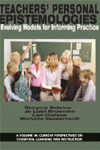
Teachers’ Personal Epistemologies
Evolving Models for Informing Practice
Edited by:
Gregory Schraw, University of Nevada - Las Vegas
Jo Lunn Brownlee
Lori Olafson, University of Nevada, Las Vegas
Michelle Vander Veldt Brye
A volume in the series: Current Perspectives on Cognition, Learning and Instruction. Editor(s): Daniel H. Robinson, University of Texas at Arlington. Marlynn M. Griffin, Georgia Southern University.
Published 2017
The focus of this book is to explore teachers’ evolving personal epistemologies, or the beliefs we hold about the origin and development of knowledge in the context of teaching. The chapters focus on a range of conceptual frameworks about how university and field‐based experiences influence the connections between teachers’ personal epistemologies and teaching practice. In an earlier volume we investigated preservice and inservice teachers’ beliefs and teaching practices (Brownlee, Schraw and Berthelsen, 2011). While we addressed the nature of teachers’ personal epistemologies, learning and teaching practices, and approaches for changing beliefs throughout teacher education programs, the volume did not address conceptual frameworks for the development of teacher’s personal epistemologies. To address this gap, the book is focused on teacher educators, teachers and teacher education programmers in universities with an overall aim of highlighting how we might support preservice teachers’ involvement in learning that is challenging and inservice teachers’ engagement in professional experiences that promote changes in teaching practice. We argue that teachers need to be encouraged to question their beliefs and develop increasingly sophisticated beliefs about their knowledge and their students’ knowledge that facilitate learning and intellectual growth.
CONTENTS
Dedication. Preface. SECTION 1: INTRODUCTION. Teachers’ Personal Epistemologies: Theoretical and Practical Considerations, Gregory Schraw, Lori Olafson, and Joanne Lunn. SECTION 2: CONCEPTUAL FRAMES WORKS FOR UNDERSTANDING BELIEFS’ The Functions of Beliefs: Teachers’ Personal Epistemology on the Pinning Block, Helenrose Fives and Michelle M. Buehl. The Epistemic Climate of Mrs. M’s Science Lesson about the Woodlands as an Ecosystem: A Classroom‐Based Research Study, Florian C. Feucht. SECTION 3: DEVELOPMENT OF BELIEFS. An Account of Teachers’ Epistemological Progress in Science, Jessica Watkins, Janet E. Coffey, April Maskiewicz, and David Hammer. Self‐Authorship as a Framework for Understanding the Professional Identities of Early Childhood Practitioners, Angela Edwards, Jo Lunn Brownlee, and Donna Berthelsen. Understanding the Epistemic Nature of Teachers’ Reasoning Behind Their Practices From an Aristotelian Perspective, Khalil Gholami. Personal Epistemology, Nature of Science and Instructional Practice: Towards Defining a Meaningful Relationship, Hasan Deniz. Exploring Bloom’s Taxonomy as a Bridge to Evaluativism: Conceptual Clarity and Implications for Learning, Teaching, and Assessing, Lisa Bendixen, Denise Winsor, and Raelynn Frazier. SECTION 4: CHANGING PRESERVICE AND INSERVICE TEACHERS’ BELIEFS. The Potential of Course Interventions to Change Preservice Teachers’ Epistemological Beliefs, Meghan Parkinson and Liliana Maggioni. Addressing Teacher Epistemology and Ideology in History Pedagogy: Teaching Historical Thinking and Media, Jeremy Stoddard. Clearing a Path for Constructivist Beliefs: Examining Constructivist Pedagogy and Pre‐Service Teachers’ Epistemic and Learning Beliefs, Melissa Duffy, Krista Muis, and Mike Foy. Exploring the Factors Contributing to Preservice Elementary Teachers’ Epistemological Worldviews about Teaching Science, Elif Adibelli‐Sahin and Janelle M. Bailey. Teaching Knowledge and Beliefs in Preservice Teachers, Gregory Schraw, Lori Olafson, and Michelle Vander Veldt Brye. The Place of Epistemological Beliefs Within Teachers’ Social Representation Systems: A Model to Explain Geography Teachers’ Practices, Fernando Alexandre. SECTION 5: PERSONAL EPISTEMOLOGY IN HIGHER EDUCATION. The Personal Epistemologies of Tutors in Higher Education, Fiona Hallett and Arthur Chapman. SECTION 6: CONCLUSION. Reflection and Reflexivity: A Focus on Higher Order Thinking in Teachers’ Personal Epistemologies, Jo Lunn Brownlee and Gregory Schraw. Biographies.
-
Paperback9781681239484
Web price: $62.04 (Reg. 72.99)
-
Hardcover9781681239491
Web price: $89.24 (Reg. 104.99)
- eBook9781681239507

- EDU000000 - EDUCATION: General
- EDU029000 - EDUCATION: TEACHING METHODS & MATERIALS: General
- EDU046000 - EDUCATION: Professional Development
-
 Assessment of Higher Order Thinking Skills
Assessment of Higher Order Thinking Skills
-
 Learning Through Visual Displays
Learning Through Visual Displays
-
 Misinformation and Fake News in Education
Misinformation and Fake News in Education
-
 Recent Innovations in Educational Technology that Facilitate Student Learning
Recent Innovations in Educational Technology that Facilitate Student Learning
-
 Social Media
Influences on Education
Social Media
Influences on Education
-
 Technology-Based Assessments for 21st Century Skills
Theoretical and Practical Implications from Modern Research
Technology-Based Assessments for 21st Century Skills
Theoretical and Practical Implications from Modern Research
-
 Use of Visual Displays in Research and Testing
Coding, Interpreting, and Reporting Data
Use of Visual Displays in Research and Testing
Coding, Interpreting, and Reporting Data

